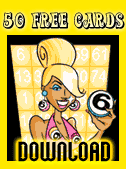
Bingo History
Online bingo articles 6
History of bingo
Bingo begins its known history in sixteenths century, with the reunification of Italy. One of the major reforms in Italy was initiation of the national state lottery, Lo Giuco del Lotto d'Italia. Ever since then, this lottery is operated by the state and brings major revenues to the country's treasury.
The national lottery was very similar to the Bingo game we know today. As it happens with gambling games, it quickly sprung out to other European countries, winning hearts of people who'd otherwise not touch gambling. Bingo was never associated with "sin" and "filth" of the gambling like the other games were in minds of deeply religious people of that age.
The italian lotto that was about to become known and famous as "Bingo" travelled into France. In 1778 the French media was maintaining that the lotto game has touched the hearts of French intelligentsia. Albeit a little different from the game today, French lotto was very similar in rules and logic of the game. There were tokens or chips instead of numbered balls; and no computing technology existed to print random lottery cards so they were crafted with other creative approarches. There was no patterns in the French bingo by then; a player would win the game when covering a horizontal rows.
Lotto gained further popularity later on when someone came up with an idea to use it as an educational tool for children. Mathematical, historical, language, natural sciences and other educational lottos came and can still be seen today in any toy store. The numeric nature of lotto was quite instrumental in education of little children for a while.
In 1929 the game was eventually brought to America from Germany. Called "Beano" (it was played with beans back then). In Beano, players would win by not only filling a horizontal line; vertical and diagonal patterns were introduced, making the foundation for today's bingo. Played in Georgia, it was picked up by an american businessman Edwin Lowe, who infected his friends in New York with the Beano addiction, soon to acquire the name "Bingo" (as in "Bean-go") and spreading like wildfire. Known as Lowe's Bingo, the first bingo was an immediate business success for Lowe.
The Bingo was then discovered by church as a harmless, pleasant game which brough a possibility of raising funds. Lowe was directly involved in modifying Bingo to suit the church's needs. Producing unique Bingo cards en masse became a difficult task, and Lowe sought academic help to devise a clever technology. Subsequently, Lowe took a lot of steps to popularize bingo, including publication of a Bingo manual book and a Bingo newsletter.
